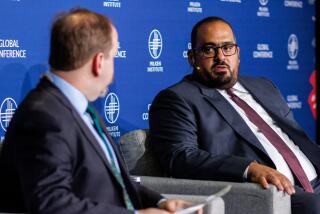Malaysian Leader Seeks Riders for His Super Corridor
- Share via
Malaysian Prime Minister Mahathir Mohamad may be an outspoken critic of Western values, but he has marched into the lion’s den--the home of the U.S. entertainment industry--this week in a bid to lure talent and technology to help revitalize his nation.
Mahathir’s whirlwind recruitment mission, which begins today with speeches at the Beverly Hills Chamber of Commerce and UCLA, is aimed at promoting his Multimedia Super Corridor, a multibillion-dollar proposal for a high-tech utopia where the wizards of gigabytes and sound bites can put their theories of 21st century life to the test.
In an interview Monday, the controversial leader of one of Southeast Asia’s fastest-growing economies said his decision to launch this venture is a concession to the power of Hollywood films, the Internet and personal computers.
While he has some concerns about unleashing a Pandora’s box of technology on Malaysian society, he does not believe it is possible to keep the beast at bay without putting the brakes on his country’s dynamic economic growth.
“I think if you can’t fight them, you join them,” he said. “That’s exactly why we are here. To invite these people to come and to understand the needs of Asian countries. . . . I think that way they can understand more about what they need to do to be popular in Asia.”
Mahathir is convinced that Malaysia’s only hope of becoming a developed nation by 2020 is to team up with the world’s top companies to determine how technology can be applied to increase economic efficiency, create new forms of entertainment and improve daily life.
Some foreigners fear Malaysia will follow the path of Singapore, which has marketed itself as a regional communications hub while still maintaining draconian controls on the flow of information and imposing hefty fines on government critics.
Malaysia has sent mixed signals to the outside world. In 1994, the predominantly Muslim country attracted the ire of Jewish groups for banning Steven Spielberg’s movie “Schindler’s List,” calling it propaganda. That same year, Malaysia imposed a trade ban on Britain after the British media printed articles critical of official Malaysian corruption.
But last year, Mahathir allowed singer Michael Jackson to give a concert in Kuala Lumpur despite demands by Muslim leaders that it be canceled as immoral.
Mahathir may share the concerns of the governments of China and Singapore, which have imposed controls on the Internet, but he doesn’t believe it is possible to effectively police the global communications network. For that reason, he has given foreign investors a written guarantee that his government will impose no Internet censorship.
“We are concerned, like many countries, about pornography and violence [on the Internet], and I think even in the U.S. people have those concerns,” said Mahathir, whose easygoing demeanor belies his image as one of Asia’s most fiery advocates. “We would hope there would be an international code at some stage which everyone will agree to.”
The Malaysian government has also agreed to pass a series of tough laws to beef up intellectual property protections, define computer crime and establish the right to use electronic signatures in legal and business transactions.
Mahathir’s dream, the brainchild of Japanese management guru Kenichi Ohmae, is taking shape in a 9-by-30-mile zone stretching south from the capital city of Kuala Lumpur to the new Kuala Lumpur International Airport, which will open in 1998.
The plan is to attract high-tech companies to the zone, where they can pursue their own projects or participate in seven giant multimedia projects backed by the Malaysian government. Those include making the Malaysian government paperless by 2000, developing Internet capability for all schools within two years and creating a regional tele-medicine center.
The Malaysian government expects to pay only a small part of the Super Corridor’s $8-billion to $15-billion price tag and is looking to the private sector to shoulder the rest.
Malaysia’s offer of a 10-year income tax exemption, fast-track processing of visas and licenses and bidding rights for the seven multimedia projects has proven very appealing to some major players.
Microsoft Corp. has agreed to participate in the project, and Sun Microsystems is setting up a laboratory to develop new versions of Java, its programming language, according to Malaysian officials. Other companies said to be interested include IBM, EDS, Hewlett Packard and Netscape.
Eric Schmidt, chief technical officer for Sun, said his company was won over by Malaysia’s attractive incentive package and the government’s willingness to make it easy to import foreign technical expertise.
Within the multimedia zone, the Malaysian government has agreed to lift immigration controls and controversial employment quotas designed to give job preference to Malays.
Mahathir doesn’t appear to be worried about the zone of creative anarchy spilling over into the rest of Malaysia.
“We feel safe because we feel if it is bad, we can still confine it to the corridor,” he said. “If it is good, we will allow it to spread.”
More to Read
The biggest entertainment stories
Get our big stories about Hollywood, film, television, music, arts, culture and more right in your inbox as soon as they publish.
You may occasionally receive promotional content from the Los Angeles Times.










